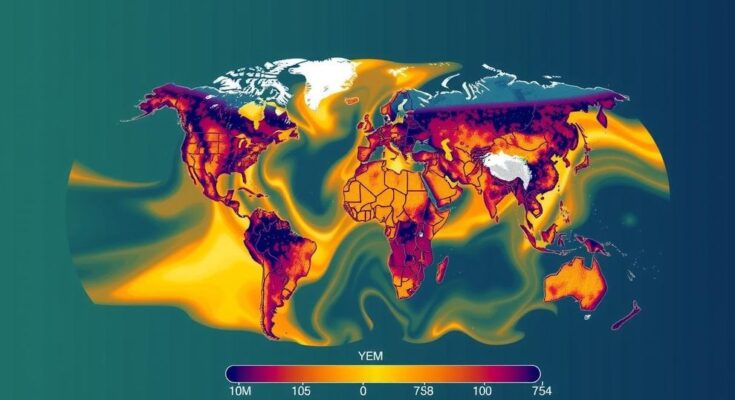Climate action efforts have not improved warming projections for the third year, with the Earth projected to warm by 2.7 degrees Celsius. Significant emissions rises in China and potential policy changes in the U.S. may worsen this outlook. Current UN climate talks focus on increasing financial commitments from wealthy nations to assist poorer countries in combating climate change impact.
Efforts to curb climate change have failed to result in improved projections for global warming for the third consecutive year, with recent developments in China and the United States likely exacerbating the situation. According to Climate Action Tracker, the Earth is on track to warm by 2.7 degrees Celsius compared to pre-industrial levels, raising concerns regarding the effectiveness of united global initiatives such as the UN climate negotiations in Baku, Azerbaijan. In stark contrast to the goals set at the Paris climate talks in 2015, the world has already warmed by 1.3 degrees Celsius. Atmospheric changes due to human activity, particularly fossil fuel consumption, have contributed to extreme weather phenomena, including floods and droughts. The available projections have shown a slight rise, with the most favorable scenario indicating a warming of 1.9 degrees Celsius, reflecting stalled emissions reduction efforts. This current trajectory has raised serious questions about the performance of climate action on a global scale. Bill Hare, CEO of Climate Analytics, remarked, “There’s an awful lot going on that’s positive here, but on the big picture of actually getting stuff done to reduce emissions … to me it feels broken.” The effects of high emissions are now evident, as both China and potential US policy regressions signal steep challenges ahead. Discussions at the ongoing UN climate talks focus on the financial responsibilities of wealthier nations toward developing countries in their effort to combat climate change. The goal for financial aid has shifted from the previous $100 billion target to a demand for an annual budget of $1.3 trillion from wealthy countries to assist global efforts toward decarbonization, climate adaptation, and recovery from severe climate events. A report led by independent experts has emphasized the urgent need for sustained investment to achieve these ambitions.
The current climate negotiations hosted in Baku represent a pivotal moment in the global fight against climate change. Global warming projections have consistently failed to improve despite ongoing efforts to curb emissions, highlighting a disconnect between political commitments and actual outcomes. The rising global temperatures, primarily attributed to human activities, threaten to trigger more frequent and devastating climate disruptions. Additionally, the economic implications for developing nations seeking to adapt to climate impacts underscore the urgency of international financial cooperation in combating these challenges.
In summary, recent analyses indicate that projections for global warming remain stagnant, with significant contributions from the largest emitters, particularly during this year’s UN climate talks. Efforts to enhance climate financing for developing nations are more critical than ever to address ongoing challenges associated with global warming. The disparity between political promises and actual emissions reductions raises critical concerns about the efficacy of existing climate initiatives and signals a need for immediate action and investment.
Original Source: www.voanews.com




